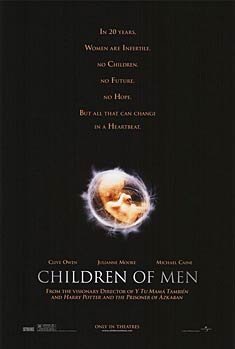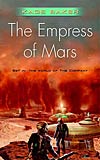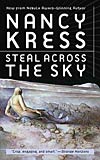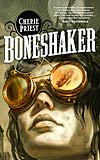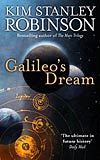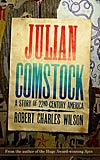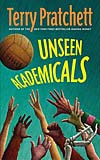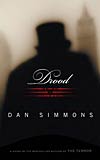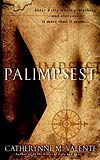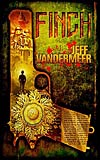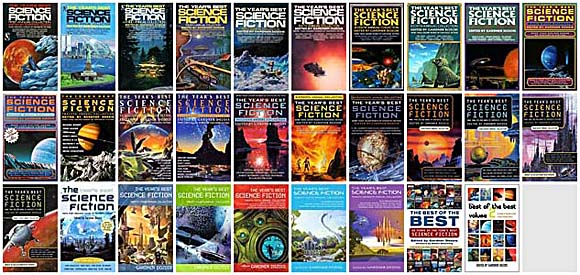The Curé of Mars
I had the happy occasion to watch a sad movie recently.
The sad movie was Alfonso Cuarón’s Children of Men, and to my mind it demonstrates the best that science fiction can be.
It’s a deeply felt movie, intense and raw, the way that Saving Private Ryan is deeply felt, intense and raw. I say it’s a sad movie, because of the world it portrays (and how close that world looks like ours), but ultimately the film’s message is one of hope.
If you’re not aware of Children of Men, the narrative is simple yet beautiful. It is the year 2027, and humanity has lost the ability to procreate. Mankind is slowly dying out. Into this cauldron of despondency, a miracle occurs – a pregnant woman (presumably the only such in the world) is discovered, and Theo Faron (played by Clive Owen) must shuttle her to safe refuge, with the hope being that scientists can learn from her how to jumpstart the human race.
There are many things to admire about this film. The realism and believability of the situation. The reliance on the genuine humanity of the characters to tell the story, rather than special effects and wild concepts. The subdued messaging backgrounded throughout the film which doesn’t draw attention to itself but adds necessary grit and political color.
I’m more than halfway through P. D. James’ book of the same name right now (the source material for the film), and it is remarkably different. The book is pastoral, academic, an epistle of despair in a decidedly English tone; the film on the other hand is ripe with street-level danger, violence, anger.
I could go on and on about the many things I love about Children of Men, enough to write a paper, but for the purpose of today I’m just going to touch ever so briefly on the character of Theo Faron.
Jonathan McDonald recently posted a link on Worlds Without End to an article by Robert R. Chase regarding the relationship between science and religion in science fiction. I found the synchronicity of this posting to be fortuitous, as Children of Men is at its heart a very religious movie. And Theo Faron, despite his jaded, secular posturing, is a decidedly religious figure.
In fact, I would go so far as to say he’s a saint. Let me explain.
In considering Theo’s transformation from cynical loner to true and loyal guide, you can’t but help see him as a post-modern St. Joseph. Protector of the mother and her child, he leads her to safety despite many obstacles, giving of himself totally to his mission. Theo’s story is a beautiful psalm of self-donation.
To my mind, it is unmistakable that Cuarón and his fellow screenwriters drew inspiration for Theo Faron from the life of St. Joseph.
This led me to consider just how freely science fiction films can dip into the lives of saints for inspiration. What follows is a brief exploration of ten saints and the film characters who echo them.
10 Lives of Saints Appropriated for Science Fiction
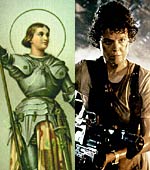 10. St. Joan of Arc – Joan’s life followed a dramatic path from a simple and seemingly inconsequential peasant to renowned warrior and leader who ultimately was burned alive for her faith.
10. St. Joan of Arc – Joan’s life followed a dramatic path from a simple and seemingly inconsequential peasant to renowned warrior and leader who ultimately was burned alive for her faith.
Cinema Equivalent: “Ellen Ripley” played by Sigourney Weaver / Alien3 (1992) – Ellen rises from a simple and seemingly inconsequential space trucker to become a leader of soldiers before being consumed by a fiery conflagration.
9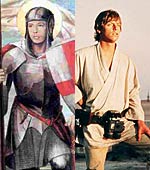 . St. George – A solider and priest, St. George is best known for his legendary exploit of vanquishing a dragon that dwelt in a lake and preyed upon a nearby town.
. St. George – A solider and priest, St. George is best known for his legendary exploit of vanquishing a dragon that dwelt in a lake and preyed upon a nearby town.
Cinema Equivalent: “Luke Skywalker” played by Mark Hamil / Star Wars: Return of the Jedi (1983) – A solider and priest, Luke counts among his most notable exploits the vanquishing of the Rancor Monster that dwelt in a pit in Jabba the Hutt’s lair.
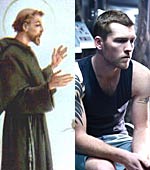 8. St. Francis of Assisi – A wild young man and one-time soldier who would undergo a conversion experience, renounce all he’d ever known to follow a simple life; a lover of nature, of the environment and of animals.
8. St. Francis of Assisi – A wild young man and one-time soldier who would undergo a conversion experience, renounce all he’d ever known to follow a simple life; a lover of nature, of the environment and of animals.
Cinema Equivalent: “Jake Sully” played by Sam Worthington / Avatar (2009) – A one-time soldier who would undergo a conversion experience, renounce all he’d ever known and discover an appreciation of nature, the environment and indigenous life.
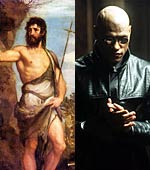 7. St. John the Baptist – During a period of struggle and conflict, he was a strong and courageous spiritual leader. St. John pointed the way for Jesus (the Messiah), whom he baptized in the Jordan River.
7. St. John the Baptist – During a period of struggle and conflict, he was a strong and courageous spiritual leader. St. John pointed the way for Jesus (the Messiah), whom he baptized in the Jordan River.
Cinema Equivalent: “Morpheus” played by Laurence Fishburne / The Matrix (1999) – During a period of struggle and conflict, he was a strong and courageous leader. Morpheus pointed the way for Neo (the One), whom he introduced to the world of the Matrix via the red pill of truth.
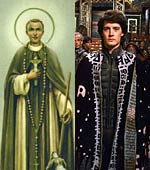 6. St. Martin de Porres – The illegitimate son of a nobleman and a former slave, St. Maretin’s family upbringing consisted of his mother and younger sister. A strong student who outshone his teachers, he became a worker of healing miracles and champion of the poor and disenfranchised.
6. St. Martin de Porres – The illegitimate son of a nobleman and a former slave, St. Maretin’s family upbringing consisted of his mother and younger sister. A strong student who outshone his teachers, he became a worker of healing miracles and champion of the poor and disenfranchised.
Cinema Equivalent: “Paul Atreides” played by Kyle MacLachlan / Dune (1984) – The illegitimate son of a nobleman and his concubine, Paul’s family upbringing consisted of his mother and younger sister. A strong student who outshone his teachers, he became a worker of miracles and champion of the disenfranchised Fremen.
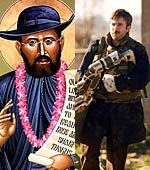 5. St. Damien of Molokai – Working among the quarantined outcasts of the leper colony of Molokai, St. Damien eventually succumbed to leprosy contamination.
5. St. Damien of Molokai – Working among the quarantined outcasts of the leper colony of Molokai, St. Damien eventually succumbed to leprosy contamination.
Cinema Equivalent: “Wikus van de Merwe” played by Sharlto Copley / District 9 (2009) – Working among the quarantined outcasts of the alien colony of District 9, Wikus eventually succumbed to alien contamination.
 4. St. Barbara – Persecuted by her pagan father, who handed her over to the Roman authorities, St. Barbara refused to renounce her Christian affiliations.
4. St. Barbara – Persecuted by her pagan father, who handed her over to the Roman authorities, St. Barbara refused to renounce her Christian affiliations.
Cinema Equivalent: “Princess Leia” played by Carrie Fisher / Star Wars: A New Hope (1977) – Persecuted by her Sith father, who handed her over to the Imperial authorities, Princess Leia refused to renounce her rebel affiliations.
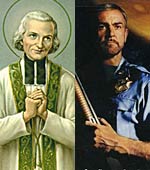 3. St. John Vianney, the Curé of Ars – An undistinguished man whose superiors held low expectations, St. John Vianney was assigned to the small out-of-the-way parish town of Ars, which he proceeded to single-handedly clean up from its vice-ridden and morally lawless ways.
3. St. John Vianney, the Curé of Ars – An undistinguished man whose superiors held low expectations, St. John Vianney was assigned to the small out-of-the-way parish town of Ars, which he proceeded to single-handedly clean up from its vice-ridden and morally lawless ways.
Cinema Equivalent: “Marshall O’Niel” played by Sean Connery / Outland (1981) – An undistinguished man whose superiors held low expectations, Marshall O’Niel was assigned to the small out-of-the-way mining station on Io, which he proceeded to single-handedly clean up from its vice-ridden and morally lawless ways.
 2. St. Paul – The great evangelist and missionary of the Church, St. Paul travelled far to deliver the message to the people of this world to atone for our obsession with sin, or perish.
2. St. Paul – The great evangelist and missionary of the Church, St. Paul travelled far to deliver the message to the people of this world to atone for our obsession with sin, or perish.
Cinema Equivalent: “Klaatu” played by Michael Rennie / The Day the Earth Stood Still (1951) – A great missionary from the stars, Klaatu travelled far to deliver the message to the people of this world to atone for our obsession with nuclear weapons, or perish.
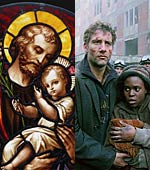 1. St. Joseph – At first reluctant to get involved, St. Joseph agrees to protect and defend the Virgin Mary and her baby. They undertake an arduous journey, and while on the road the Virgin Mary gives birth to the miracle child who is the hope of humanity. Father, mother and infant then flee into Egypt to escape persecution.
1. St. Joseph – At first reluctant to get involved, St. Joseph agrees to protect and defend the Virgin Mary and her baby. They undertake an arduous journey, and while on the road the Virgin Mary gives birth to the miracle child who is the hope of humanity. Father, mother and infant then flee into Egypt to escape persecution.
Cinema Equivalent: “Theo Faron” played by Clive Owen / Children of Men (2006) – Theo, approached by his former lover (Julian) to help secretly transport a girl (Kee) across security-tight Britain, is at first reluctant to get involved. When he discovers Kee’s pregnancy, however, he agrees to protect and defend Kee and her baby. They undertake an arduous journey, and while on the road Kee gives birth to the miracle child who is the hope of humanity. Theo, Kee and her baby must then flee out of the Bexhill Refuge camp to the sea.
I can’t do Children of Men justice with a paltry blog, but I can say that as long as our filmmakers continue to bring us deeply felt stories such as this, I have no doubt that science fiction film has a bright future.
DON’T FORGET – BATTLEFIELD EARTH CHARITY CHALLENGE!
Worlds Without End created a tribute fund through St. Jude Children’s Research Hospital –
Help us reach our charity goal. Make a donation, be my charity sponsor, and I promise I will sit through an entire viewing of Battlefield Earth, no matter how painful it gets.2010 Arthur C. Clarke Award Winner – The City & The City
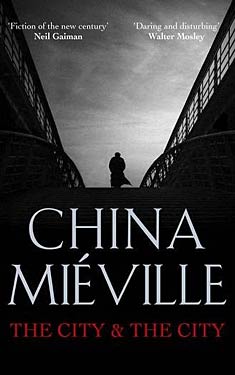 The winner of the 2010 Arthur C. Clarke Award for best novel has been announced. The winner is:
The winner of the 2010 Arthur C. Clarke Award for best novel has been announced. The winner is:
The City & The City by China Miéville (Del Rey; Macmillan UK)
China is now the first author to ever win the Clarke three times and is understandably over the moon with the news pronouncing himself "absolutely gobsmacked" and "incredibly honoured" to win.
Congrats to China Miéville for another win.
The City & The City is really racking up the accolades having just won the 2009 British Science Fiction Association award it’s also still in the running for the 2009 Nebula and the 2010 Hugo and Locus Fantasy awards.
Incredibly, four of China’s books appear on the WWEnd Top Nominated Books of All-Time list.
Flesh and Fire – Take One Down and Pass it Around
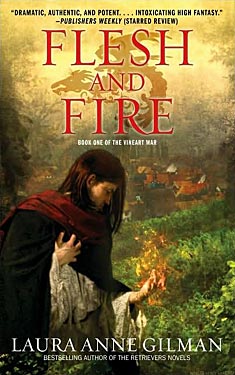 Flesh and Fire, the new Nebula Award-nominated title by Laura Anne Gilman, is out in hardcover from Pocket Books. This captivating story offers up a fresh and heady world where magic is accessed through the medium of wine, and where spells are incanted and decanted. Magicians are "vinearts", who study all their lives to understand the subtleties of the wines in their vineyards and the unique magic that can be summoned through them. Different kinds of wine carry unique magical properties, which the vinearts are responsible for creating.
Flesh and Fire, the new Nebula Award-nominated title by Laura Anne Gilman, is out in hardcover from Pocket Books. This captivating story offers up a fresh and heady world where magic is accessed through the medium of wine, and where spells are incanted and decanted. Magicians are "vinearts", who study all their lives to understand the subtleties of the wines in their vineyards and the unique magic that can be summoned through them. Different kinds of wine carry unique magical properties, which the vinearts are responsible for creating.
The world of the Vin Lands are enticingly served up to us. Practitioners of the wine-based magic and the land’s temporal powers co-exist somewhat comfortably, and peace is more the rule than the exception. Life is good, especially if you’re a vineart or one of the princelings. There is a slave caste, a social device made all the more interesting because new vinearts are chosen from their ranks and not through the middle or upper classes. Life revolves around the grape and the vineyards are at the heart of the Vin Lands. Gilman’s simple, direct style draws you into the story, and makes you feel like putting your boots up on the table and pouring a nice glass of bourdeaux.
The book pours out the tale of a young vineart-to-be, Jerzy. This young lad takes the familiar path of a youngster learning about the world, learning about himself, and learning magic. Boy meets grape, boy learns how to zip off a handy fire spell, with a hint of oak and a light nutty aftertaste. In the Merlin/Obi Wan role is a gruff but not unkind chap named Malech. He’s a comfortably accomplished vineart with his own vineyards and country house, and a large staff of servants who putter around baking bread and teasing Jerzy and occasionally beating the slaves. Toujours a magical Provence. Should we care about the slavery aspect of this book, at this point? Barkeep! Another glass of that house white and be quick about it!
But hold the bottle! Danger, menace and schemes threaten the Vin Lands, disrupting the harvests, the political balance of power between the vinearts and the princelings, and more importantly, Jerzy’s education. Monsters ravage the vines, slosh up on the coastlines to consume villages, and pull down wine keg stuffed galleons into the briny depths. Because the peace of the land has depended on a very diffuse power structure, the reaction to all this mayhem is, well, a tipsy blend of consternation and denial. It is up to gruff Malech and his young protege Jerzy to get to the bottom of all these wine-threatening goings-on. Will they find out who is thrashing the peaceful vineyard towns and villages? Will Jerzy grow into an accomplished vineart before or after he decides he likes girls? Barkeep! A glass of that house red damn your eyes!
"Flesh and Fire" uses some standard plot devices that we’ve all seen before, but it is a genuinely engaging magical wine-tasting session of a tale. The real lure of the book is the magic/wine relationship, so lovingly and almost worshipfully given to us that we can taste it. The book is suffused with this heady version of magic, it is as ambient as the gritty technology of William Gibson. So when all is said and done, this is a thoroughly enjoyable read, and I can heartily recommend it – paired with a vintage Merlot.
Reviewing Miller, Part 1
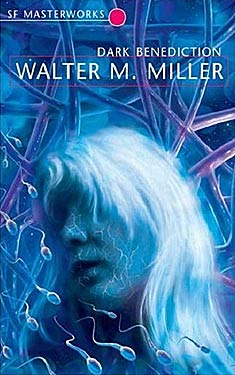 Walter Miller’s fiction has long been a favorite of mine. A Canticle for Leibowitz is not just one of my favorite science fiction novels, but one of my favorite novels altogether. There’s something peculiarly epic about that story, and I don’t mean that in the cheap way the word “epic” is generally used these days. I mean it in the way that scholars use it, as a way of describing a story that is universal in scope and powerfully vivid in detail. Leibowitz follows the historical development of mankind after a near-future nuclear inferno, during which we relive the great sweep of civilization from the Roman collapse to the modern, technological age. Miller gives us monks and politicians and radiation-born freaks who remember enough of the past—of our past—that they fear repeating it even as they fatalistically drive towards it. Like I said, it’s one of my favorite books, and it was not a small disappointment to hear that its sequel, Saint Leibowitz and the Wild Horse Woman, was very poorly made and published by way of some major contributions from another author after Miller had committed suicide with only a partial manuscript in hand. You can imagine my glee upon discovering that a collection of his earlier short stories have been published.
Walter Miller’s fiction has long been a favorite of mine. A Canticle for Leibowitz is not just one of my favorite science fiction novels, but one of my favorite novels altogether. There’s something peculiarly epic about that story, and I don’t mean that in the cheap way the word “epic” is generally used these days. I mean it in the way that scholars use it, as a way of describing a story that is universal in scope and powerfully vivid in detail. Leibowitz follows the historical development of mankind after a near-future nuclear inferno, during which we relive the great sweep of civilization from the Roman collapse to the modern, technological age. Miller gives us monks and politicians and radiation-born freaks who remember enough of the past—of our past—that they fear repeating it even as they fatalistically drive towards it. Like I said, it’s one of my favorite books, and it was not a small disappointment to hear that its sequel, Saint Leibowitz and the Wild Horse Woman, was very poorly made and published by way of some major contributions from another author after Miller had committed suicide with only a partial manuscript in hand. You can imagine my glee upon discovering that a collection of his earlier short stories have been published.
This collection, entitled Dark Benediction (originally The Best of Walter Miller Jr), has been recently republished by the Orion Publishing Group as a part of the SF Masterworks series. The very trippy cover art can be seen to the left. I purchased it a few weeks ago, and have been slowly making my way through the stories, and I decided that reviewing them one by one would make a great blog series. The first few stories in the collection are quite short, and as such I will combine these together into groups of two. The first two stories in the collection are “You Triflin’ Skunk!” and “The Will.”
Both of these stories share a common sort of setup and development, in both senses of the word “common.” They are set in poor, rural places, and feature largely uneducated people as protagonists. Miller instills in the reader a sense of the mundanity of these people and their surroundings, of their ignorance and simpleness. These people are not great, learned, or even adventurous, but they are all about to experience a collision with the uncanny.
You Triflin’ Skunk!
“You Triflin’ Skunk!” is exceptional firstly for its unusual title, which would seem to suit a Flannery O’Connor story better than one of alien visitation. Indeed, the rural isolation of the religious protagonist Lucey seems like the perfect setup for one of O’Connor’s morality tales, and it helps that Miller takes his time developing the ordinariness of the situation, only revealing the back story of Lucey and her epileptic boy Doodie one piece at a time. Doodie, you see, hears voices during his fits, and he claims he actually hears the voice of his father, who can speak to him telepathically through the tumor-like growth in his forehead. The boy claims to be one of many half-breeds, the son of a priapic alien and a human mother, whose purpose is to prepare the earth for invasion. Lucey mocks this revelation, but that doesn’t stop her from carrying a shotgun with her outside on the night her son warns of his father’s coming.
The Will
This is the sad story of a boy, Kenny, who is diagnosed with an unspecified terminal disease. He loves watching the televised exploits of Captain Chronos, “Custodian of Time, Defender of the Temporal Passes, Champion of the Temporal Guard,” so when he finds out about his disease he hatches a plan to save himself. I won’t ruin it for you, but it isn’t that hard to figure out. As with the first story, “The Will” builds up the mundane world of Kenny and his parents before Miller sets to ripping the rug out from beneath your feet. One of the things Miller does so well is to make you care about these characters before he starts to bother you with fantastic elements of science fiction. His characters are never mere plot devices, but real people who matter very much. These aren’t exactly morality plays—and Leibowitz definitely had a moral character—but the stories are at least about people rather than ideas.
Tune in next week when I review “Anybody Else Like Me?” and “Crucifixus Etiam.”
Love is a Battlefield
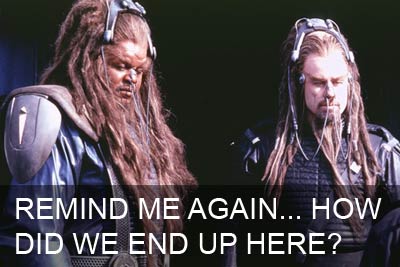 Should artists apologize for their work?
Should artists apologize for their work?
(No, I’m not gearing up to make amends for the poor quality of my blogs. Get over yourself.)
In considering artistic apologies, let’s review the recent hullabaloo regarding Battlefield Earth.
Within the last several weeks, it was reported that the screenwriter of Battlefield Earth (who shall remain nameless out of consideration for his well being), upon being notified that the film was chosen the worst of the decade by the Razzie Awards, issued an apology for its suckiness. I haven’t seen the film, but I’m going to go out on a limb and assume it’s pretty bad.
Noseplugs. Codpieces. Vinnie Barbarino. Scientology. Yeah, all that together is likely what I would classify as pretty bad.
Now, I question the screenwriter’s sincerity. First, he’s a writer, so he’s automatically suspect. But then, rather than take full ownership for his sins, he stepped over the line and pointed the finger at a second party.
In this case, the second party was the Scientologists. “They changed the entire tone. I knew these notes would kill the movie.”
Now, I’m not in the business of taking up for the Scientologists, but haven’t they been picked on enough? It’s not bad enough they almost got Tom Cruise kicked out of Germany. Or that a heavy rotation of enemas factor into their regimen. They have to take responsibility for producing Battlefield Earth, too?
C’mon, screenwriter guy. Own it. Well, in fairness, he did.
“Now, looking back at the movie with fresh eyes, I can’t help but be strangely proud of it. Because out of all the sucky movies, mine is the suckiest.”
Anyway, all this “worst movie of the decade” talk got to me thinking that we could use this opportunity somehow to raise money for a worthy cause. But how? Then it hit me.
For charity, I will sit through a complete viewing of Battlefield Earth and write about it.
I think I’m up for the challenge. After all, I suffered through both Pandorum and Cloverfield within the last week, which I figure is like going to training camp for slogging through a viewing of Battlefield Earth. How much worse can it be? (I’m afraid to find out.)
Regrettably, my local library (where I get all my free movies) didn’t have a copy of Battlefield Earth, so I had to go out and buy one (I really need to get on NetFlix).
Here’s the deal:
Worlds Without End has created a tribute fund through St. Jude Children’s Research Hospital. Your part is to go to the website and make a donation to the tribute fund. Big or small, they will take it all and put it to good use.
For my part, I will sit through Battlefield Earth at the end of May (tentatively May 27) and share the love in a future edition of Thies’ Pieces. Be my charity sponsor, and I promise I will sit through the entire film, no matter how painful it gets.
From St. Jude’s website:
St. Jude Hospital has become a world renowned research facility in the area of pediatric cancers such as leukemia. Children from all across the U.S. as well as 60 foreign countries have been admitted to St. Jude without regard for the family’s ability to pay.
St. Jude relies on the generosity of people like you to continue vital research and patient care programs, which are saving many young lives. Because of this support, St. Jude has seen the survival rate for Acute Lymphoblastic Leukemia (ALL), the most common form of leukemia, increase from 4% in 1962 to 94% today.
Help us out and let’s raise a nice sum for St. Jude and the families they assist.
Cameron’s Brain Hurts
James Cameron had this to say in an interview with the LA Times:
No, [I’m] not so much an avid science-fiction reader anymore. I probably spend more time writing than reading science fiction. I find that science-fiction literature is so reactive to all the literature that’s gone before that it’s sort of like a fractal. It’s gone to a level of detail that the average person could not possibly follow unless you’re a fan. It iterates upon many prior generations of iterations. The literature now is so opaque to the average person that you couldn’t take a science-fiction short story that’s published now and turn it into a movie. There’d be way too much ground work you’d have to lay. It’s OK to have detail and density, but if you rely on being a lifelong science-fiction fan to understand what the story is about, then it’s not going to translate to a broader audience. Actually, literary science fiction is a very, very narrow band of the publishing business. I love science fiction in more of a pop-culture sense.
Full interview: "James Cameron: The ‘Avatar’ sequel will dive into the oceans of Pandora"
2010 Locus Award Finalists
The finalists for the 2010 Locus Awards have been announced. Winners will be presented during the Science Fiction Awards Weekend in Seattle WA, June 25-27, 2010.
Science Fiction Novel:
- The Empress of Mars, Kage Baker (Subterranean; Tor)
- Steal Across the Sky, Nancy Kress (Tor)
- Boneshaker, Cherie Priest (Tor)
- Galileo’s Dream, Kim Stanley Robinson (HarperVoyager; Ballantine Spectra)
- Julian Comstock: A Story of 22nd-Century America, Robert Charles Wilson (Tor)
Fantasy Novel:
- The City & The City, China Miéville (Del Rey; Macmillan UK)
- Unseen Academicals, Terry Pratchett (Harper; Doubleday UK)
- Drood, Dan Simmons (Little, Brown)
- Palimpsest, Catherynne M. Valente (Bantam Spectra)
- Finch, Jeff VanderMeer (Underland)
Congrats to all the nominees! See the full news release from Locus for the details on the other categories.
So what do you think of this lineup? Which ones have you read or want to read? The City & the City and Boneshaker are showing up on a lot of short lists this season.
Juke Box Hero

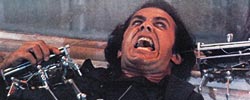
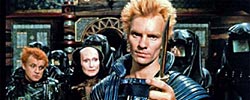
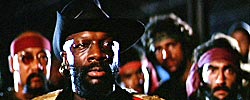
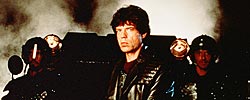
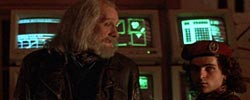
You may remember that a few weeks back I examined the influence of Kim Milford and Laserblast, science fiction’s version of Reefer Madness.
This week, we’re going to consider a different kind of reefer madness: namely, the use of pop musicians as actors in science fiction films.
Milford’s star-crossed career (one-time lead singer of the Jeff Beck Group, as well as front man for Moon, a 1970s rock outfit) got me to wondering: What other ill-advised cross-pollinations have taken place between popular music and science fiction film?
I’m not sure what’s the deal, but for some reason it seems that directors like to cast rock ‘n’ rollers in science fiction films. And I don’t just mean cameos, which in themselves are frankly pretty annoying.
(Aren’t cameos just a distraction that says, “Hey, don’t forget you’re only watching a movie and here’s a famous person we roped in to pull you out of the story!” As if someone – i.e. the director – was trying to leverage his way into a Hollywood party via stunt casting. Either that or it’s a goofy studio trick to get butts in seats.)
We decided to poll our readers to see what you think. So here we are, with a quest to discover the 10 most unnecessary rock ‘n’ roll crossovers into science fiction.
Here’s the skinny. Listed below are the names of popular musicians and the films they’ve appeared in. Rather than give you our top 10, we figured we’d give you a list and you can decide for yourself which are the 10 that were the most unnecessary.
We limited our list to actual roles. Meaning no cameos, which generally range from the silly (Huey Lewis in Back to the Future) to the pointless (Ministry in A.I.). We also didn’t include any actors who later tried and failed to become popular musicians (so no, Spock Sings and Keanu’s Dogstar didn’t qualify their thespians for the list).
Also, if we missed any candidates, feel free to add ‘em to your list.
So here are the good, the bad, and the ridiculous. Happy voting.
From the list below, choose your top ten most unnecessary rock ‘n’ roll crossovers into science fiction:
- Adam Ant / Cyber Bandits (1995)
- Annette Funicello / Dr. Goldfoot and the Bikini Machine (1965)
- Annette Funicello / The Monkey’s Uncle (1965)
- Billy Idol / Heavy Metal 2000 (2000)
- Common / Terminator Salvation (2009)
- David Bowie / The Man Who Fell to Earth (1976)
- David Johansen / Freejack (1992)
- Debbie Harry / Videodrome (1983)
- Dweezil Zappa / The Running Man (1987)
- Flea / Back to the Future II (1989)
- Flea / Back to the Future III (1990)
- Frankie Avalon / Dr. Goldfoot and the Bikini Machine (1965)
- Frankie Avalon / Voyage to the Bottom of the Sea (1961)
- Gene Simmons / Runaway (1984)
- Grace Jones / Cyber Bandits (1995)
- Harry Connick Jr. / Independence Day (1996)
- Harry Connick Jr. / The Iron Giant (1999)
- Henry Rollins / Johnny Mnemonic (1995)
- Huey Lewis / Sphere (1998)
- Ian Dury / Judge Dredd (1995)
- Ice Cube / Ghosts of Mars (2001)
- Ice-T / Johnny Mnemonic (1995)
- Ice-T / Tank Girl (1995)
- Iggy Pop / Hardware (1990)
- Iggy Pop / Tank Girl (1995)
- Isaac Hayes / Dream Warrior (2003)
- Isaac Hayes / Escape From New York (1981)
- Isaac Hayes / Oblivion (1994)
- Isaac Hayes / Oblivion 2: Backlash (1996)
- Jamie Foxx / Stealth (2005)
- Janet Jackson / The Nutty Professor 2: The Klumps (2000)
- Jennifer Lopez / The Cell (2000)
- Jerry Garcia / Heartbeeps (1981)
- Kris Kristofferson / Millenium (1989)
- Kris Kristofferson / Planet of the Apes (2001)
- LL Cool J / Deep Blue Sea (1999)
- LL Cool J / Rollerball (2002)
- Ludacris / Gamer (2009)
- Mark Wahlberg / The Happening (2008)
- Mark Wahlberg / Planet of the Apes (2001)
- Martin Kemp / Cyber Bandits (1995)
- Michael Des Barre / Nightflyers (1987)
- Mick Fleetwood / The Running Man (1987)
- Mick Jagger / Freejack (1992)
- Mos Def / The Hitchhiker’s Guide to the Galaxy (2005)
- Pat Boone / Journey to the Center of the Earth (1959)
- Queen Latifah / Sphere (1998)
- Ruben Blades / Predator 2 (1990)
- RZA / Repo Men (2010)
- Sting / The Bride (1985)
- Sting / Dune (1984)
- Tiffany / Jetsons: The Movie (1990)
- Tina Turner / Mad Max Beyond Thunderdome (1985)
- Toni Basil / Village of the Giants (1965)
- Tricky / The Fifth Element (1997)
- Tyrese Gibson / Death Race (2008)
- Tyrese Gibson / Transformers (2007)
- Tyrese Gibson / Transformers: Revenge of the Fallen (2009)
- Vanity / Neon City (1991)
- Will I Am / X-Men Origins: Wolverine (2009)
- Will Smith / I Am Legend (2007)
- Will Smith / I, Robot (2004)
- Will Smith / Independence Day (1996)
- Will Smith / Men in Black (1997)
- Will Smith / Men in Black II (2002)
- Will Smith / Wild Wild West (1999)
- Willie Nelson / Starlight (1996)
- Xzibit / The X Files: I Want to Believe (2008)
First Things on Science & Religion in Sci-Fi
 Robert R. Chase has a long and interesting article about the ambivalence of science fiction writers when it comes to depicting religion in their novels. He discusses such authors as Arthur C. Clarke, Robert A. Heinlein, Philip K. Dick, Robert J. Sawyer and Gene Wolfe, among others.
Robert R. Chase has a long and interesting article about the ambivalence of science fiction writers when it comes to depicting religion in their novels. He discusses such authors as Arthur C. Clarke, Robert A. Heinlein, Philip K. Dick, Robert J. Sawyer and Gene Wolfe, among others.
An excerpt:
Last year, the blog SF Signal asked writers to weigh in on the question of whether science fiction is antithetical to religion. Fifteen writers took up the challenge. Their outlooks ranged from the sharp-edged atheism of James Morrow to the enthusiastic Christianity of the convert John C. Wright. Readers—and, no doubt, the editors—expected loud anathemas, biting sarcasm, and lordly sneers. Instead, to their surprise and disappointment, a polite consensus emerged: No, the two are not antithetical.
The reasons were varied. Some referenced the many religious science-fiction books and authors as proof that science fiction and religion cannot be antithetical. The atheists, for the most part, recognized that religious belief is a general human characteristic that is not likely to go away, Arthur C. Clarke to the contrary, and that writers thus must be willing to take it seriously to describe characters realistically.
The Year’s Best Science Fiction
We’ve just added the complete The Year’s Best Science Fiction series to our database! In case you’re not familiar, this is considered by many to be THE anthology series for serious readers of science fiction short stories. The annual collection is edited by Gardner Dozois, multi Hugo Award winning editor and author, and each volume includes dozens of stories from a veritable who’s who of Science Fiction’s best and brightest.
The list of authors to appear in TYBSF includes Stephen Baxter, James P. Blaylock, Gwyneth Jones, Jonathan Lethem, Robert Reed, Walter Jon Williams, Gene Wolfe, Nancy Kress, Dan Simmons, Paul J. McAuley, Alastair Reynolds, Greg Egan, Ken MacLeod, Bruce McAllister and Charles Stross just to name a few. Dozois includes veterans and rising stars in each yearly edition as well as an insightful summation of the year’s events and a lengthy list of honorable mentions.
Anthologies are a bit of a departure for WWEnd. Our main focus is on award nominated novels but there is always room for a few anthologies. So what do you think? Do you want to see more? Have you read any of these? Any collectors out there got ’em all?



















 Full Details
Full Details
